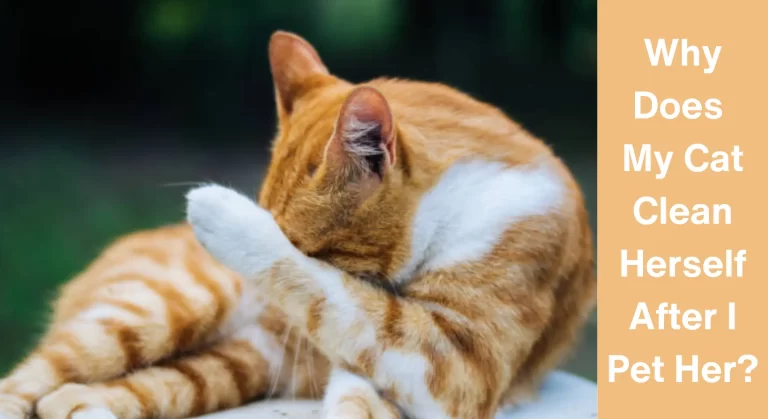Can a Neutered Cat Live with an Unneutered Cat [Explained]
For various good causes, most cat owners must consider neutering their cherished cats. Despite all of these advantages of neutering, you can run into some other issues. If you own two felines, one of which is neutered while the other isn’t, you may be concerned about how both cats will get along and communicate.
It’s not a good idea to bring up your neutered or intact cat, whether male or female. The reason is that non-neutered male or female felines take mating, power, and territory very seriously. Moreover, intact felines tend to pee and attack your defenseless neutered feline; when the hormones of intact cats are active. There are many chances that they will harm or hurt each other with their teeth and claws.
Hence, to help you understand if neutered felines can survive with intact felines, we have conducted thorough research and identified the potential issues. To learn more regarding this, continue reading the details:

Can a Neutered Cat Live with an Unneutered Cat
Certainly, cats who have been neutered and those that have not can live together peacefully. They have the same socializing options as any other cat.
The intact cat might take some time to warm up, but if it becomes agitated or sexually repressed, it won’t think twice about attacking the neutered feline. That’s because the unneutered animals can become quite violent, whereas the neutered ones stay laid-back and calm, and you may get into some issues.
Don’t worry too much despite the possibility of issues, as there are various alternatives. Neutering the intact cat is initial and most noticeable. Second, if circumstances don’t happen the way you want, several kennels will care for your cat.
Also Read: Cat Lethargic 3 Days After Spay: Is It Normal? Things Cat Owners Should Know
Can You Keep a Male Cat Without Neutering?
You may have a male feline without neutering him; however, there might be some dangers and disadvantages.
Unneutered male cats may act more aggressively and territorially, battling with other felines, splashing pee to establish their territory, and participating in other unwanted behaviors like biting and clawing. These actions may cause damage to your property, other pets, or family members and can be challenging to control.
Moreover, testis cancer, prostate issues, and UTI are among the health issues unneutered male felines are more likely to have. These health risks and the possibility of behavioral disorders can both be avoided by neutering your male feline.
Male cats should normally be neutered to ensure their good health and the security and happiness of other domestic pets and family members. If you decide to maintain a male cat that hasn’t been neutered, be ready to take special care to regulate his behavior and wellness.
Will Male Cats Fight if One is Neutered? Will an Unneutered Cat Fight A Neutered Cat?
Male felines can quarrel even though one has undergone neutering and the other has not. The aggressive instincts of male felines can be controlled through neutering, although not all of them. Examples include territory marking and competing for females.

Unneutered male felines will fight more frequently, but conflicts can still happen among intact and neutered males or between 2 neutered felines. Fighting among cats can be harmful and lead to wounds, infestations, and other health issues.
If you own several male felines, taking precautions is crucial to reduce the likelihood of fights. This may involve giving every cat separate supplies (such as food dishes, litter trays, and living areas). Try to introduce new felines to one another slowly and give them various opportunities for playing and activity.
If your felines get into a fight, it’s crucial to keep them apart and seek guidance from a vet or a pet behaviorist to help address the underlying problems. According to these concepts in mind, it is frequently advised to neuter both cats.
Check Out: How to Stop My Cat From Bullying My other Cat?
Should You Neuter the Other Unneutered Male Cat?
Many cat owners and veterinarians agree that neutering an intact feline, particularly a male, is something you need to think about. As male felines’ penises frequently feature spikes and thorns, so mating with a female feline at that time would be extremely uncomfortable and even quite painful.
Male cats may engage in unpleasant behavior because they are captivated by female felines. As an illustration, they might begin peeing all over the home to claim their domain, showering your household with an unbearable strong odor. In such situations, neutering the male feline might simplify caring for both felines.
Neutering the male feline is vital because a spayed female feline won’t be eager to have sex with an intact male feline. It would be uncomfortable if the male cat kept poking and chasing the female feline despite the female feline intentionally avoiding sexual intercourse with him.
Hence, you can consider neutering the male feline to ensure your spayed cat is safe from this persecution.
What if Both the Cats are of the Same Sex?
Cats of the identical gender occasionally engage in sexual activity even though they aren’t homosexual. For example, a cat owner has neutered one male feline before the other. The intact male feline soon began acting strangely with the neutered male feline after he got the neutering surgery. The second male cat, who had been neutered, began attempting to engage in sexual relations with the first, driving the first cat crazy and angry.
But a huge shock, the intact male cat showed no such behavior towards the other spayed female felines. So this made it even more difficult to explain their actions.
Will an Unneutered Male Cat Try to Mate with a Spayed Cat?
No, the reason is that a non-spayed female cat undergoes a ” heat cycle,” which draws intact male felines. A female cat who has been spayed won’t go into heat because her sex hormones are removed, producing sexual hormones that urge her to mate. Resultantly, she will lose interest in mating.

Moreover, you know that male cats are attracted to females when they’re in heat or produce sexual hormones. So, a female feline cannot produce those hormones when she becomes spayed. Thus, the intact male cat won’t try to mate with her.
Also, it’s proven by studies that when female cats are spayed intact, males don’t force that for mating unless they again start to produce sexual hormones.
Interesting Reading: When Do Male Cats Go Into Heat?
Can Cats Still Have Sexual Desires or Be Sexually Active After Being Neutered?
During a neutering procedure, a feline’s sex organs are eliminated. The body of the feline won’t release mating hormones as a result. After the operation, hormones can still be present if the feline has achieved the adult stage. In this case, the feline may temporarily resume mating due to these sex hormones.
The cat’s sex desire will progressively disappear after some weeks of the surgery because, at that time, the level of sex hormones will decline due to the removal of sex organs.
After being neutered, a female feline may still have some functional ovarian tissue left in her belly; if she still exhibits symptoms of heat many weeks later. This is known as ovarian remnant disease.
This doesn’t indicate that the vet has made a mistake while performing the surgery; rather, it frequently happens due to extra ovarian tissue or stimulated cell lines in the uterus that was present before the ovaries were taken. A second surgery is often required to extract the leftover ovarian tissue when a feline is diagnosed with ovarian remnant disease.
Also, if a spayed feline is introduced to hormonal creams or drugs, she may exhibit symptoms of sexual excitement or heat. Keep estrogen, progesterone, and other hormones away from your cat’s access if you have these in your house. Remember that your cat doesn’t lick the region where a therapeutic hormonal cream has been put if you’re using it.
Even though adrenal tumors can trigger a cat to release too many hormones, among which are hormones that regulate sex drive. A female feline may seem to be in heat due to this. Lab testing and abdominal ultrasonography may be required if your veterinarian suspects your feline has an adrenal tumor. Your veterinarian will probably advise surgery to examine the abdomen and extract the tumor.
Also Read: Can a Neutered Male Cat Still Get a Female Pregnant?
How to Accommodate A Neutered Cat with An Unneutered Cat?
The introductory process of an intact cat with a neutered cat must be handled with care if you want to introduce a new feline into the household of a current cat with as little anxiety as possible for everybody.

Before taking your new feline home, see your vet if it fits. A sturdy barrier for around 1week should separate both cats before being introduced. A useful approach is a locked door having a small hole underneath.
Letting them sniff, listen, and engage with each other may help them become used to the idea that a second cat is present.
You have to keep both cats apart until they feel comfortable, don’t growl or hiss any longer, and even without attempting to sneak underneath the door with each other.
After you and your cat have reached this agreement, allowing them to share space is okay. However, battles may occasionally break out as the hormonally charged, unneutered feline tries to act like a tom cat, show his territory, and injure the neutered feline.
Also, Check Out: Why Is My Cat Hissing at Other Cat After Vet
Frequently Asked Questions
When is the Best Time to Neuter a Cat?
A feline’s age, fitness, and way of living are only a few variables that influence the ideal time to spay/neuter a feline. According to studies, you can neuter cats between the ages of 5 and 6 months.
So, although some vets might advise neutering the feline as soon as 8 weeks, others might choose to wait till the animal is a little older, between 8 and 12 months.
Can A Male Unneutered Cat Live with Two Female Cats That Are Spayed?
Yes, an intact male feline may live with 2 spayed female felines; however, there are many chances that the male feline will spray and even attack the female ones. Moreover, an intact male will be more powerful than spayed females, so he may also hiss or growl over them, leading to serious disputes. So, it’s advised to introduce them slowly and to provide each feline with its separate resources.
Is It Normal for A Neutered Cat to Fight with an Unneutered Cat?
So, in general, yes, it’s quite natural for your neutered feline to attack your intact feline despite the operation. The reason is that their innate need to establish leadership will still exist, and occasionally, their rage may manifest itself in physical conflict.
Even so, intact male cats tend to be the most hostile against one another. The main reasons for this include male cat competition and unneutered male felines roaming and protecting a slightly wider region.
Final Words!
Sure, neutered felines can coexist with intact cats; however, a few things should be remembered.
First, it’s crucial to remember that unneutered cats, or those who haven’t been neutered, might display violent and territorial behaviors against other felines, which may cause tension and dispute in a home. Although it might not completely stop them, neutering male felines can aid in lowering certain habits.
To ensure that intact and unneutered felines live happily, it is also crucial to introduce them gradually. Moreover, offer each cat its own space in which to rest, eat, and utilize the litter tray in addition to gently introducing them to one another at a time.
The success of exposing a neutered feline to an intact feline will ultimately depend on the characteristics and character traits of the specific cats, along with their living situations and the attention their homeowners provide them. Always seek advice from a vet or animal behaviorist if you are experiencing any worries or inquiries.
Related Posts:
Who is Isabella?
My name is Isabella, and I am a dedicated and knowledgeable cat enthusiast. With years of experience caring for cats and a deep love for felines, I made a mission to help other cat lovers navigate the challenges of cat ownership.






